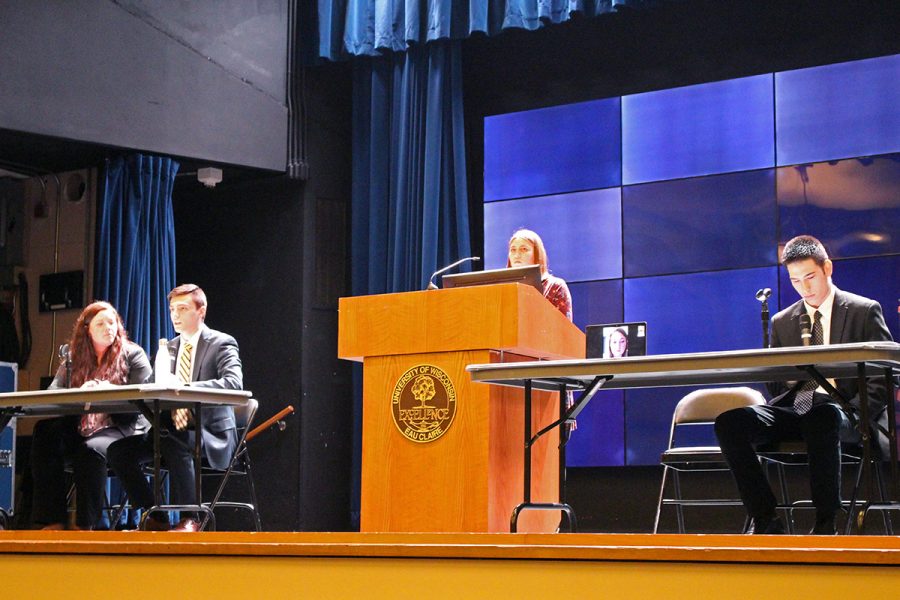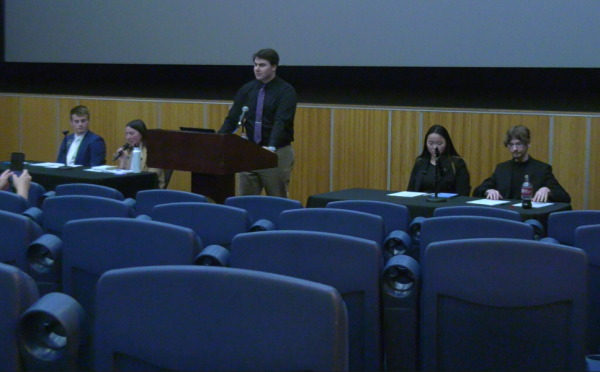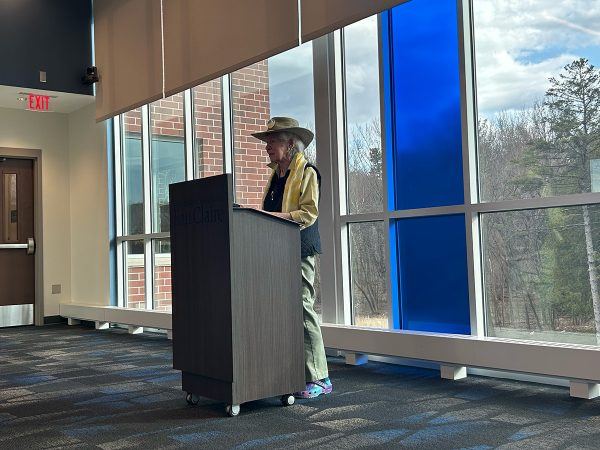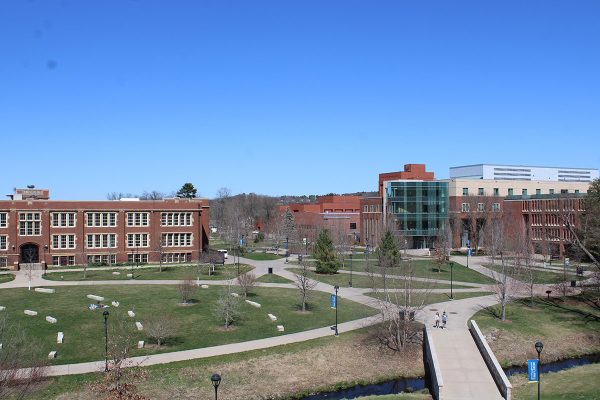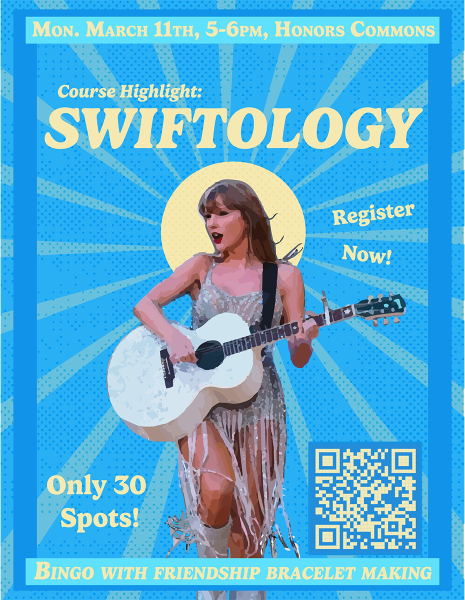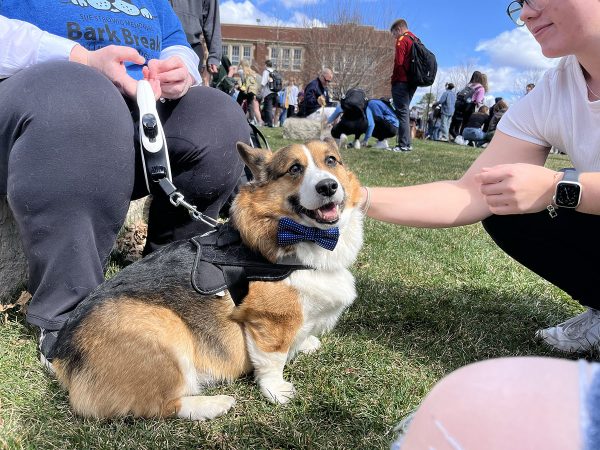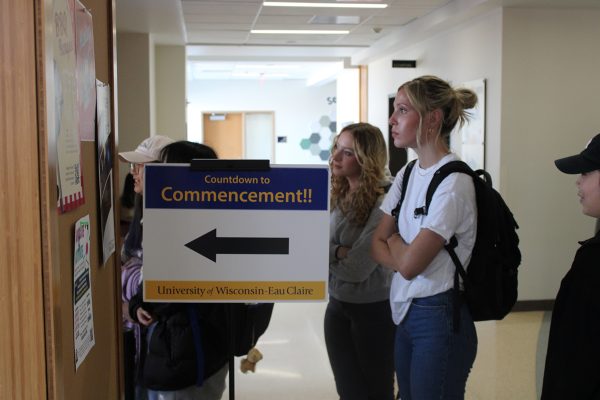Student Senate Elections: A breakdown of the candidates
Voting takes place in April 16-18 elections via an email link
Photo by Kar Wei Cheng
From left to right: Candidates Maddie Forrest (vice president) and Branden Yates (president), and Hattie Salzman (vice president, tuning in via video chat) and Robert Nguyen (president) participate in the Student Body President Debate on Wednesday.
The conclusion of the local elections signals the beginning of the campaign season and upcoming election for UW-Eau Claire’s student body president, vice president and student senators.
Students will vote for one executive ticket along with 30 senators. Running for the presidency and vice presidency on one ballot are juniors Branden Yates and Maddie Forrest, and on the other ballot, second-years Robert Nguyen and Hattie Salzman.
On Yates’s and Forrest’s ticket, there are 25 candidates running for Senate seats. Nguyen and Salzman aren’t running with a ticket. However, there are students running independently for seats. There will be 11 on-campus seats and 19 off-campus seats that candidates will vie for.
Voting begins on Monday, April 16 and goes through Wednesday, April 18. An email will be sent to all students at 8 a.m. on Monday with online voting instructions to vote for their student representatives in the 62nd Session of Student Senate.
“Bridging the Gap:” Branden Yates (President) and Maddie Forrest (Vice President)
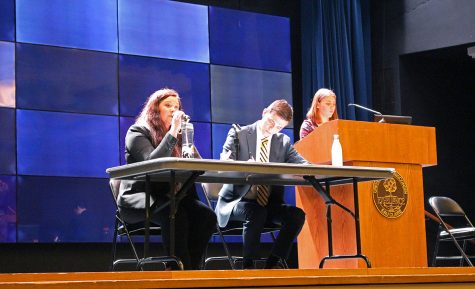
Maddie Forrest (vice president) and Branden Yates (president)
Branden Yates, a junior business administration and political science student, is running alongside Maddie Forrest, a junior integrated strategic communications public relations student with a fine arts administration certificate, under the slogan “Bridging the Gap.”
“We’ve seen just a lack of representation and lack of communication between a lot of different parts of campus, so we decided to ‘bridge the gap,’” Forrest said.
Yates has been involved in Student Senate since his second semester of freshman year, and has held seats on various commissions within Senate and committees on and off campus, such as the Welcome Center Pre-design Committee and the Public Good Order ad hoc committee. He also serves on the shared governance committee for the UW System restructuring. He has been a Resident Assistant for a year and a half, and was also involved in Residence Hall Association.
Within Senate, Yates has been a part of the Finance Commission, the Campus Affairs Commission and the Intergovernmental Affairs Commission. Currently, he serves as Senate’s chief of staff.
Forrest is completing her first full session on Senate as an off-campus senator, serving on the University Activities Commision and the Communications Commission. Last year, Forrest’s friends encouraged her to run for Senate in order to increase representation for students who spend a lot of time in the Haas Fine Arts Center.
When Forrest first arrived at UW-Eau Claire, she said she was committed to devoting her college career to music but eventually decided against it. Nonetheless, she is still involved in the campus concert choir and the women’s Audacious A Capella group, experiences which Forrest said propelled her to see a gap between Senate and students “across the river” in Haas Fine Arts Center and the Human Sciences and Services (HSS) building.
Together, Yates said their differences allow them to bring different perspectives to student leadership.
“It’s pretty cool that the top two student leaders can have such different experiences because when we go talk to the administration, we can talk about what (Maddie’s) experienced in Haas, what I’ve experienced in Schneider (Hall) and what the larger student body has experienced,” Yates said.
In fact, their slogan “Bridging the Gap” is meant to be interpreted in many different ways, encompassing the campus as well as the Eau Claire community.
“I think that bridging the gap is something that everyone can do on different levels,” Forrest said. “So it’s something that students can relate to as well even if they’re not on Student Senate.”
Yates said he became concerned with bridging the gap when he first joined Senate, noting the disconnect between the student body and student government.
Addressing the Public Good Order ordinance, Yates said there are community concerns about student housing that need to be taken into consideration while trying to effectively represent student voices and concerns.
“For us at upper level of presidency and vice presidency, we’re definitely going to have to bridge the gap between us and the community,” Yates said.
There’s also a focus on increasing transparency and accountability between students and the administration on various topics, including Equity, Diversity and Inclusivity (EDI) goals, Yates said.
“I think the administration sometimes likes to make decisions and then go back and get student input,” Yates said. “We’re hoping that they get input first and then they can make the decision. Even if the decision isn’t our way, at least our voices were heard.”
Yates and Forrest pointed to the recent nonresident tuition increase as an opportunity for them to hold the university administration accountable for putting the revenue towards EDI initiatives. To do this, the duo drafted a resolution alongside other senators acknowledging that Senate would recognize the administration as liable for putting those funds towards Blugold Beginnings, a program that has recently struggled with funding.
In addition to increasing transparency and accountability, Yates and Forrest said they are focused on improving communication with and representing student organizations’ needs in Senate.
“Since what we do is allocate money to student organizations, we need to make sure that Student orgs understand the opportunities that they have within Senate,” Forrest said, adding that she and Yates have been reaching out to as many student organizations as possible before the election to learn how they can address individual needs if elected.
Yates and Forrest said they are also focused on student safety within the Third Ward and Historic Randall Park neighborhoods.
“I think off-campus housing safety is going to be a huge, huge concern,” Yates said. “And I know it was kind of a platform of the candidates last year and definitely we’re going to try to continue that this year and next year because it is a big deal.”
In addition to their campus involvement, Yates credited his and Forrest’s numerous fostered relationships with administration and campus circles as the pair’s most qualifying attributes for the presidency and vice presidency.
“We can help represent more and more ideas and more voices just based on what we’ve already been involved in,” Yates said.
Forrest said though she and Yates have differing opinions on some topics, what is important is being a representative for students.
“We don’t always agree, and that’s okay because Senate is non-partisan,” Forrest said. “This isn’t about the politics of it. It’s about creating student change and being a representation for students.”
“Putting Blugolds First:” Robert Nguyen (President) and Hattie Salzman (Vice President)
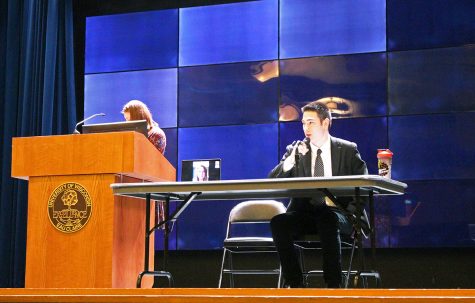
Robert Nguyen (president) and Hattie Salzman (vice president, via a video call)
Robert Nguyen, a second-year organizational communication student running for student body president, chose Hattie Salzman, a second-year integrated strategic communications public relations student, as his running-mate. The two are campaigning under the slogan “Putting Blugolds First.”
Nguyen and Salzman are not running on a traditional president ticket, which normally includes a list of students running with the leadership team.
“We feel it favors party lines, and Senate is a nonpartisan institution, so we do not support that,” Nguyen said.
Nguyen is a first-generation Vietnamese-American and the first member of his family to go to college. He is a member of the Senate and works as the Outreach and Inclusivity Coordinator and was a student member of the team that implemented EDI goals. Nguyen has also tutored middle school students as a One to One Mentor.
When he chose a campaign partner, Nguyen said he looked to a friend; someone he could trust.
“Hattie is an expert communicator and has a work ethic that is unmatched,” Nguyen said.
Salzman is the first member of her family to attend college, too. Though she is not part of Student Senate currently, Salzman is part of the executive board for UW-Eau Claire’s chapter of Public Relations Student Society of America and a member of DECA. She said she has a background in helping organizations raise funds through public campaigns.
Salzman said both she and Nguyen are leaders in their families — both have been pushing their younger siblings to apply for college and realize their full potentials.
“We feel that us running together will pull diverse perspectives from both of our lived experiences,” Nguyen said.
And, the candidates said, it’s not just their viewpoints that will be amplified: Student voices will be at the forefront of their priorities. This belief is a reflection of their slogan “Putting Blugolds First.”
Nguyen said sometimes Senate “strays” from benefiting students. If elected, the pair would do their best to serve as a link between students, faculty and the administration.
“I’ve seen students get lost in the system, especially lower-income students,” Salzman said.
She said she believes there is a disconnect between Senate and the student body because many students do not know who to approach with ideas. The best way to solve the problem, Salzman said, is by listening.
If elected, Nguyen and Salzman said they will make an effort to be an accessible resource for students by engaging in “casual conversations” and following up on the problems presented to them by bringing student issues before Senate.
Salzman said a strength of her campaign is the ability to be “relatable.” Nguyen and Salzman are students first, she said, and therefore share the same struggles and triumphs as many other Blugolds.
Continuing their focus on student life, Nguyen and Salzman said they are devoted to creating more conversations about campus inclusivity. They said they plan to work towards surpassing the university’s EDI goals by bolstering the Senate’s Equity in Student Matters (ESM) Commission and intentionally appointing students with diverse backgrounds to leadership positions.
Nguyen said he is in favor of a bill Senate is currently considering that will restructure the way Senate seats are allocated to better represent voices of students. If the bill passes, a referendum will be held in the fall for the student body to voice their opinions.
One result of inclusion is often change, Salzman said, which can feel awkward to some at first.
“People need to start being comfortable with being uncomfortable,” Salzman said.
Nguyen cited his time on the EDI search and screening committee as revealing. Being knowledgeable about the interworking of the administration will help him in the future, he said, especially when strengthening UW-Eau Claire’s diversity.
The candidates said they want to aid student groups with members who have marginalized identities. Nguyen said he will help such organizations by providing them with more funding and outreach. Salzman, who has done public relations work for a handful of student groups, said there is a misconception that some student organizations are “better” than others.
“All organizations are equal,” Salzman said. The candidates said they plan on making Salzman’s sentiment clear if elected.
Another issue important to Nguyen and Salzman is campus area safety. Nguyen said he plans to work with University Police and administration to increase campus and off-campus neighborhood lighting and patrolling to ensure everyone feels “safe and secure.”
Parking is a structural issue that affects both students and faculty, Nguyen said. Therefore, faculty voices will be included in the search for a solution.
Nguyen and Salzman said they were excited to announce an idea they created to deal with Eau Claire’s harsh winter weather: the two want to place a dome over the footbridge on campus. If elected, Nguyen said they will pitch the idea to Housing and Residence Life and then create a petition or referendum that will allow the entire student body to voice their opinions.
The candidates said they can be held accountable for legislative action.
“If we say something, we’ll do it,” Salzman said.
The team said they will reach for “feasible change,” but no challenge is impossible.
Nguyen and Salzman emphasized the importance of communication, transparency and fairness in leadership. The pair said they hope to gain the vote of the student body because they value the well-being of students over their personal success.
“Someone needs to fight more for Blugolds,” Salzman said. “We’ll do that.”

